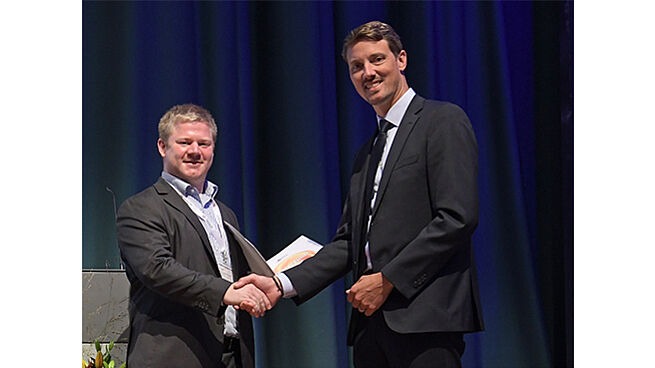Award recognizes excellence in young academic researchers and provides new impetus for the refractory industry

Hardheim, September 29, 2021: At the International Colloquium for Refractories (ICR), Maschinenfabrik Gustav Eirich awarded the 12th Gustav Eirich Award (GEA) together with ECREF, the European Centre for Refractories. The award is given to honor three outstanding dissertations, theses, or scientific papers from the last two years on topics relating to refractory materials. With the GEA, EIRICH and ECREF aim to support and promote young academic researchers from all around the world. This year’s winners completed their doctorates in universities in Germany, Poland, and France.
Since the invention of the EIRICH mixer in 1924, the global refractory industry has been one of the core sectors for Maschinenfabrik Gustav Eirich. As a co-sponsor of the Gustav Eirich Award alongside the ECREF European Centre for Refractories, EIRICH is honoring dissertations and scientific papers that offer potential benefits and – in particular – transfer potential for the global refractory industry. “Innovation is an important success factor for survival in the modern, global world. Together with ECREF, EIRICH wishes to support and encourage the commitment and dedication of young specialists in the refractory industry in order to help shape the long-term development of the industry and guide it to a more environmentally-aware and sustainable future,” says Stephan Eirich, CEO of Maschinenfabrik Gustav Eirich. In terms of subject matter, the papers covered topics relating to refractory materials and investigations into materials – with the key phrase being “high-temperature materials.” Here, a jury comprising representatives from science and industry assessed aspects such as reduced consumption of raw materials and reduced emissions in the refractory industry. As part of the assessment, it was very important for applicants to demonstrate that they really understood the award criteria of the Gustav Eirich Award, rather than to submit just a generic abstract of their work.
The international jury with representatives from Germany, France, Austria, Poland, Spain, and the USA decided to give awards to the following submissions:
1st place: Dr. Johannes Kasper–University of Koblenz and Landau, Germany
“Setting models for PCE-dispersed and CA-cement-bonded refractory castables”
The paper investigated key fundamental studies in order to improve understanding of the behavior of refractory concretes during setting. The new learning has been transferred to the refractory industry and will lead to the development of more durable refractory linings.
2nd place: Dr. Diana Vitiello – University of Limoges, France
“Thermo-physical properties of insulating refractory materials”
This paper investigated the reduction of thermal losses during steel production by means of improved insulating refractory materials, with simultaneous increased durability of the refractory linings. Dr. Vitiello authored her dissertation as part of the PhD student network ATHOR and was supported by the European Union.
3rd place: Dr. Jakub Stec – AGH University of Science and Technology, Poland
“3D pore structure and infiltration resistance of micropore carbon materials”
This practice-oriented paper investigated the behavior of carbon bricks in furnaces. These refractory materials, which are integrated in the frame of the furnace, are subjected to very extreme conditions and ultimately define the service life of the furnace.
The recipients of the awards received prizes of EUR 3,000, 2,000, and 1,000 respectively.
With this award of excellence, the ECREF European Centre for Refractories as a science-promoting institution of the German refractory industry association Deutsche Feuerfest-Industrie (DFFI) has set itself the goal of supporting and promoting young academic researchers. “An important driver is the desire to transfer new knowledge to the application and to the refractory industry. At a global level, the refractory industry faces the challenge of helping to shape the green transformation of the process industry. This is only possible on the basis of research, innovation, knowledge, and the transfer, i.e. application, of this new knowledge,” explains Dr. Christian Dannert, CEO of ECREF.
For the Gustav Eirich Award 2022, applicants can submit dissertations and independent scientific work, such as theses or post-doc research work, up to June 30, 2022. No more than two years must have passed since the scientific work was completed.
For more information, please visit www.eirich-award.eu